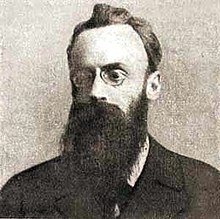Alexander Alexandrowitsch Kiesewetter
Alexander Alexandrovich Kiesewetter ( Russian Александр Александрович Кизеветтер ; born May 10 . Jul / 22. May 1866 greg. In St. Petersburg ; † 9. January 1933 in Prague ) was a Russian historian , university lecturer and publicist .
Life
Kiesewetter's great-grandfather was a blacksmith in Thuringia . The grandfather was a musician and settled in Russia . The father Alexander Ivanovich Kiesewetter studied law at the University of St. Petersburg and, as a State Councilor, headed the archive of the General Staff in St. Petersburg. The mother Olimpiada Nikolajewna geb. Turchaninova was the granddaughter of Protoiereus and church music composer Pyotr Turtschaninow and daughter of a history teacher. In 1868 the family moved to Orenburg , where the father was a representative of the War Ministry at the Governor General .
After attending the Orenburg boys' grammar school in 1884, Kiesewetter studied at the historical and philological faculty of Moscow University (MGU) . He heard the lectures of WO Klyuchevsky and PG Vinogradov and took part in PN Milyukov's special courses on the historiography of Russian history . After completing his studies in 1888 as a candidate , he stayed at Klyuchevsky's chair for history in preparation for the master's degree . He also taught history and geography at the Lasarew Institute for Oriental Languages , the Polytechnic Museum and at WI Guerrier's advanced courses for women . After the death of his fellow student AA Kudrjawzew he took care of his family and in 1894 married the widow Jekaterina Jakowlewna, nee. Frauenfelder.
From 1897 Kiesewetter held special lectures on historiography, domestic politics in the first half of the 20th century and Emperor Alexander II's reform of the peasant liberation of 1861. In 1898 he became a private lecturer . He published a lot in Russkoye Bogatstvo , Shurnal dlja wsech and other magazines. He also wrote a number of popular scientific works that appeared as individual brochures . In 1903 he received his master's degree.
Kiesewetter had been a member of the Liberation Union since 1904 . In 1905 he took part in the founding congress of the Constitutional Democratic Party (Cadets) . At the 2nd Congress in 1906 he was elected to the Central Committee of the Cadets. In 1907 he was a member of the 2nd State Duma .
In 1909 Kiesewetter defended his doctoral dissertation on the urban order of Catherine II , which continued his master's dissertation. In the same year he became a professor. In 1917 he became a corresponding member of the Russian Academy of Sciences .
After the education minister LA Kasso intervened in the academic rights of the professors, Kiesewetter left the MGU. His teaching is now focused on the Higher Courses for Women , the Trade Department and the Schanjawski - People's University . He only returned to the MGU in March 1917.
After the October Revolution , Kiesewetter gave lectures on Russian history in the theater courses at the Maly Theater . From February 1919 he directed two archives and became a professor at the 2nd Moscow University . During this time he was arrested three times as a member of the Cadets and was finally expelled from the country in 1922. After a short stay in Berlin , he and his family settled in Prague in January 1923 . He lectured on Russian history at the Russian Legal Institute , People's University and Charles University . He also took part in the social life of the Russian colony. He was a member of the Russian Academic Foreign Organization and Vice-President, from 1932 President of the Russian Historical Society.
Kiesewetter was buried in the Olšany cemetery in Prague . In 1993 he was rehabilitated.
Web links
- Literature by and about Alexander Alexandrowitsch Kiesewetter in the catalog of the German National Library
Individual evidence
- ↑ a b c d Brockhaus-Efron : Кизеветтер, Александр Александрович.
- ↑ a b c d Летопись Московского университета: Кизеветтер Александр Александрович (accessed May 28, 2017).
- ↑ РЕВОЛЮЦИЯ 1905–1907 гг. ГЛАЗАМИ КАДЕТОВ (Из дневников Е. Я. Кизеветтер) (accessed May 27, 2017).
| personal data | |
|---|---|
| SURNAME | Kiesewetter, Alexander Alexandrowitsch |
| ALTERNATIVE NAMES | Кизеветтер, Александр Александрович (Russian) |
| BRIEF DESCRIPTION | Russian historian, university professor and publicist |
| DATE OF BIRTH | May 22, 1866 |
| PLACE OF BIRTH | St. Petersburg |
| DATE OF DEATH | January 9, 1933 |
| Place of death | Prague |
